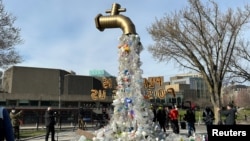Countries are under pressure to make progress on a first-ever global plastics treaty this week, but they face tense negotiations in the Canadian capital with parties deeply divided over what the treaty should include as talks begin on Tuesday.
If governments can agree on a legally binding treaty that addresses not just how plastics are discarded, but also how much plastic is produced and how it is used, the treaty could become the most significant pact to address global climate-warming emissions since the 2015 Paris Agreement.
The production of plastics accounts for some 5% of climate emissions and could grow to 20% by 2050 unless limited, according to a report last week from the U.S. federal Lawrence Berkeley National Laboratory.
When countries agreed in 2022 to negotiate a legally binding treaty by the end of this year, they called for addressing the full life cycle of plastics — from production and use to waste.
But as negotiations kick off in Ottawa, there is staunch opposition from the petrochemical lobby and some governments dependent on fossil fuels to limiting production or banning certain chemicals.
Thousands of delegates, including negotiators, lobbyists and nonprofit observers, were expected at the Ottawa summit, the fourth negotiating round ahead of a final agreement due in December — making this one of the fastest U.N.-led treaty efforts to date.
"This process is without doubt an accelerated and ambitious one, because we don't have decades to act," said Inger Andersen, executive director of the United Nations Environment Program.
Deep divisions
The chair of the Ottawa negotiations told Reuters he planned to split national delegates into seven working groups this week to address unresolved issues, including what the treaty should include and how it should be implemented.
"Time is not our best ally," said summit chair Luis Vayas Valdivieso, Ecuador's vice minister of foreign affairs.
During the last treaty talks in November in Nairobi, there was strong support from 130 governments for requiring companies to disclose how much plastic they produce and which chemicals they use in the process.
With plastics production on track to triple by 2060, supporters say such disclosures are a basic first step in controlling harmful plastic waste — the vast majority of which ends up as trash marring landscapes, clogging waterways or in landfill — and harming public health.
Almost a fifth of the world's plastic waste is burned, which releases high amounts of carbon emissions. Less than 10% of it is recycled, according to U.N. data.
However, a handful of fossil fuel-dependent nations calling themselves the "Like-Minded Countries" have argued against limiting production or banning certain chemicals. The group, which includes Saudi Arabia, Russia and China, says the treaty should focus only on tracking plastic waste.
The position is shared by the petrochemical industry.
"We are looking at the agreement to accelerate actions that industry is already doing on its own," such as boosting recycling and redesigning plastic products, said Stewart Harris, a spokesperson for the International Council of Chemical Associations.
Saudi officials declined to comment. The state-owned oil company Saudi Aramco has said it plans by 2030 to be sending nearly one-third of its produced oil to petrochemical plants to make plastics.
China, which produces roughly a third of the world's plastic, "has always attached great importance to the control of plastic pollution and is willing to work with other countries to make joint progress in negotiations," Chinese Foreign Ministry spokesperson Lin Jian said.
In the opening session, key regional blocs outlined key elements they want to see in a treaty.
The Asia Pacific group said that countries should receive financial and technical assistance for waste management infrastructure as they take on new obligations under the agreement.
The Africa group called for the creation of a new multilateral fund to help developing countries meet new obligations under a treaty and called attention to the fact that the continent has become a target for illegal trade of plastic waste.
Arguing for ambition
It is unclear whether the countries asking for production limits can persuade the holdouts to support such a measure. Environmental groups and scientists say production limits are essential.
"More plastic production means more plastic pollution," said Bjorn Beeler, international coordinator of the International Pollutants Elimination Network.
The biggest generator of plastic waste, the U.S., has refrained from joining the negotiating blocs.
More than 60 countries making up the so-called High-Ambition Coalition, including European Union members, Mexico, Australia, Japan and Rwanda — and most recently Ukraine, are arguing for a strong treaty that tackles production and requires transparency and controls for chemicals used in the process.













